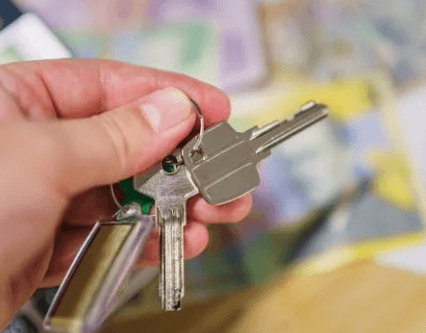Home purchasing is a monumental achievement, but the journey doesn’t end at closing. One of the most important documents you’ll need to secure is the deed to your property. In this guide, we’ll walk you through the essential steps to get the deed to your house, ensuring your ownership is officially and legally recognized. Whether you’re a first-time homebuyer or a seasoned property investor, understanding how to get the deed to your house is crucial for protecting your investment and enjoying peace of mind as a homeowner.
Experienced real estate investors like Steve Daria and Joleigh have navigated the complexities of obtaining property deeds multiple times. Their expertise has helped simplify the process, making it accessible even for first-time homebuyers. With their insights, you’ll understand how to get the deed to your house efficiently and effectively.
Types of Property Deeds
Before we discuss how to get the deed to your house, it is essential to understand the different types available:
Warranty Deed
A warranty deed gives the seller full ownership of the house or property and the legal right to sell it.
This type of deed also ensures that the property is free from any encumbrances or claims, providing the highest level of protection to the buyer.

Quitclaim Deed
A quitclaim deed transfers whatever inclination the seller has in the property without any securities or warranties.
This means the buyer assumes all risks regarding the property’s title and any potential issues that may arise.
Special Warranty Deed
A special warranty deed offers limited guarantees, covering only the period during which the seller owned the property.
This means the seller warrants that they have not done anything to encumber the property but makes no assurances about the actions of previous owners.
1. Preparing for the Title Search
A crucial step to get the deed to your house is conducting a thorough title search.
This process ensures that the property’s title is clean and free from liens, disputes, or other encumbrances.
Steps for Conducting a Title Search
- Hire a Title Company: Experts can conduct the search on your behalf.
- Check Public Records: Visit the county recorder’s office to review property records.
- Review Findings: Ensure there are no unresolved claims or issues that could affect your ownership.
Get An Offer Today, Sell In A Matter Of Days
2. Closing the Deal
Once the title search confirms a clean title, the next step is closing the deal, which involves several important tasks.
This includes checking and signing the closing documents, such as the deed, mortgage agreements, and disclosure forms.
It is also necessary to ensure that all financial transactions, such as transferring the purchase price and paying closing costs, are completed.
Key Steps in the Closing Process
- Review Closing Documents: Verify all documents for accuracy and completeness.
- Secure Financing: Ensure your mortgage or financing is finalized.
- Sign the Deed: The seller must affix a signature on the deed in the presence of a notary public.
3. Recording Your Deed
After the deed is signed, it must be documented with the county recorder’s office to officially establish your ownership.
How to Record Your Deed
- Submit the Deed: Provide all necessary documents and pay any required fees.
- Obtain a Receipt: Keep a record of your submission for your records.
- Verify Recording: Confirm that the deed has been officially recorded in your name.
4. Ensuring Accuracy of Your Deed
Errors on your property deed can lead to significant issues in the future.
It’s crucial to review the document thoroughly before finalizing it.
Common Mistakes to Avoid
- Misspelled Names: Ensure all names are spelled correctly to prevent legal disputes.
- Incorrect Property Description: Verify that the property description accurately reflects your property.
- Missing Signatures: Confirm that all required parties have signed the deed to validate its legality.
5. Protecting Your Deed
Once you receive your property deed, safeguarding it is essential to prevent loss or tampering.
Store in a Safe Place
Keep the original deed in a fireproof safe at home.
This protects it from physical damage such as fire or water, ensuring its longevity and security.
Create Digital Copies
Scan the deed and store electronic copies in secure cloud storage.
This provides a backup that can be accessed easily if the original is lost or damaged.

Inform Trusted Individuals
Ensure family members or advisors know where copies are stored.
This helps in emergencies or in situations where someone needs to access the deed on your behalf.
6. Leveraging Professional Assistance
Navigating the process of obtaining a property deed can be complex.
Engaging professionals such as real estate attorneys, title companies, and real estate agents can streamline the procedure and ensure all legal requirements are met.
Expert Knowledge
Professionals like real estate agents and attorneys possess a deep understanding of property transactions’ intricacies.
Their expertise ensures that every step of the process is handled correctly and efficiently, from title searches to finalizing the deed.
Reduced Stress
By managing the extensive paperwork and legal requirements, professionals significantly reduce your stress.
They take care of the details, permitting you to focus on the other side of buying or selling your property.
Error Prevention
Professionals have the ability to pinpoint and resolve potential issues before they become major problems.
Their keen eye for detail helps avoid costly mistakes and ensures a smooth transaction process.
Conclusion
Acquiring the deed to your house is a critical step in securing your property rights. By understanding the types of deeds, conducting a thorough title search, efficiently closing the deal, recording the deed promptly, ensuring accuracy, and protecting the document, you can ensure a successful property transaction and get the deed to your house.
If you are embarking on a real estate journey, consider seeking professional guidance to navigate the process seamlessly and enjoy your property with peace of mind.
**NOTICE: Please note that the content presented in this post is intended solely for informational and educational purposes. It should not be construed as legal or financial advice or relied upon as a replacement for consultation with a qualified attorney or CPA. For specific guidance on legal or financial matters, readers are encouraged to seek professional assistance from an attorney, CPA, or other appropriate professional regarding the subject matter.

